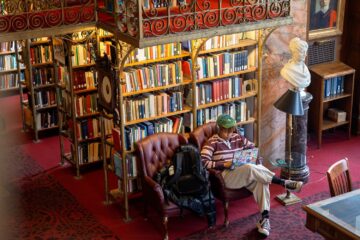Grad Tips: Library Pointers
September 30, 2024
As a graduate student, you have a lot to learn. Scholarship and research aside, there are many facets of the graduate school experience that are important to your success but might not be obvious or easy to figure out. Between achieving a sense of well-being, attending to basic needs, maintaining relationships or caring for others, etc., there’s a lot to keep track of.
The Graduate School is here to help. With the Grad Tips series, we’ll be providing insight into different aspects of the graduate student experience, sharing tips and advice on how to get the most out of your time at Cornell. To vote on the next topic in the series, check for a poll in upcoming issues of the Graduate School newsletter, News and Events.
This week’s topic: Library pointers

There’s no shortage of information and resources at Cornell, whether you’re completing research for your thesis or dissertation, teaching a class, or even tackling a side project. The Cornell University Library boasts more than a dozen library locations containing millions of books and other materials, along with ways to access content even when away from Ithaca – whether you’re on the Cornell Tech campus or studying in absentia. Cornell also employs a host of librarians eager to share their knowledge.
“It’s important that graduate students are aware of the amount of things that a librarian can do to support them over the course of their graduate student journey,” said Hannah Toombs, engaged learning librarian and liaison to Latin American and Caribbean studies. “Take the time to get familiar with Library services.”
Are there special spaces or resources just for graduate students?
The Find a Space tool offers students the ability to filter by location; whether or not a reservation is needed; sound level; what furniture, accessories, and technology the space contains; intended activity; and who is able to use the spaces. All Library spaces are available to students regardless of school or college.
The Library also offers a graduate student-specific companion page, containing links to information on finding help when you need it, tools for research and publishing, access to collections, teaching support, skills for graduate study and future work, and community and collaboration.

How can the Library support my research?
Librarians can connect you with resources you never knew existed at any phase of your research. Students beginning their programs may have questions about engaging with literature in specific subject areas or disciplines, learning how to use particular databases or indexes, or working with data. Students later in their programs might have questions about citation or data management, data curation or replication, or acquiring texts. If ever facing uncertainty, the best course of action is to speak with a librarian.
To make an appointment, visit the Meet with a Librarian page and request a meeting. Describing your research needs on the request form will enable a match with a librarian in your subject area.
“We get a variety of different questions because we help everyone,” said Christina Sheley, interim associate university librarian for public services.
Librarians are familiar with many resources that students may not be aware of, including hundreds of subject- and discipline-specific databases Google Scholar can’t access.
“Get to know your liaison librarians, because they are subject specialists that can always support students,” she said.
And, if Cornell doesn’t have what a student needs in its sizeable collection, there are Library services that can facilitate external borrowing: BorrowDirect allows students to borrow a book from other Ivy League institutions, and Interlibrary Loan enables the borrowing of physical materials from other libraries and universities. If students are still unable to access a text integral to their research through these methods, they can use the Recommend a Purchase feature, which proposes an item for the Library to add to its collection.
“It’s a lot of personalized research support to help graduate students make the most of their research and find the best sources,” said Toombs.

How can the Library support my teaching?
Teaching support can look different for each teaching assistant (TA). Librarians can help TAs prep their courses, put materials on reserve for their students to interact with, and locate their course readings. Subject librarians and liaisons can also work with TAs to diversify their syllabi, for example by providing access to content like digitizing a film for the purpose of the class.
Librarians can also collaborate with TAs on course instruction. TAs can invite librarians into their classes to provide students with an introduction to doing research at the Library or even teach their students zine making or podcasting.
What else can I access through the Library?
The Library loans out a range of tech devices, including laptops, audio recorders, camcorders, cameras and lenses, podcasting equipment, projectors, speakers, and tripods from Olin Library, and laptops, cameras and attachments, microphones, and projectors. If you’re getting crafty, you can find sewing machines and button makers at Mann Library.
But wait, says Toombs, there’s more:
“Graduate students should be aware that the Library also offers more fun resources, because that’s important to us as well: We have games, streaming services, and things that can help them decompress,” she said. “We have a wide range of resources available to support them.”

What types of help exist for me to leverage?
Library workshops focus on accessing its services, using an ORCID, citation management, and data management, among other topics, and an annual immersion program invites doctoral students in the humanities and social sciences looking to become more efficient scholars to learn about technologies, tools, and research skills in greater depth.
For constant, consistent access to information on copyright help, data services, Geographic Information Systems, and more, a variety of Research Guides are available on the Library website.
Students can set up one-on-one consultations with liaison librarians for assistance with subject- and discipline-specific research, but also other topics such as scholarly publishing, copyright advising, evidence synthesis, and privacy services. Humanities and interpretive social sciences students can find additional support through the Digital CoLab as well.
“We’re really interconnected with the entire university; we’re plugged into all of the colleges and schools,” said Sheley. “If we don’t know the answer, we typically know how to refer you out to somebody else within the campus community.”
In sum: When in doubt? Ask a librarian.
